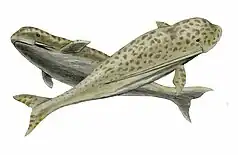| Eurhinodelphis Temporal range: | |
|---|---|
 | |
| Skeleton of E. longirostris | |
| Scientific classification | |
| Domain: | Eukaryota |
| Kingdom: | Animalia |
| Phylum: | Chordata |
| Class: | Mammalia |
| Order: | Artiodactyla |
| Infraorder: | Cetacea |
| Family: | †Eurhinodelphinidae |
| Genus: | †Eurhinodelphis Du Bus, 1867 |
| Species | |
| |
Eurhinodelphis ("well-nosed dolphin") is an extinct genus of Miocene cetacean. Its fossils have been found in Belgium, France, and Maryland.
Species
Currently-valid species are:[1]
- E. cocheuteuxi
- E. longirostris
Former species include:
- E. bossi, now a species of Xiphiacetus.
Description

Eurhinodelphis was around 2 metres (6.6 ft) in length. In most respects, it would have looked like a modern dolphin or porpoise, but its upper jaw was elongated into a sharp tip similar to that of a swordfish. Most likely, Eurhinodelphis used it in a similar manner to swordfish, hitting or stabbing prey. It also had long, sharp teeth.[2]
Compared with earlier fossil species, Eurhinodelphis had complex ears, suggesting that it already hunted by echolocation like modern whales. Its brain was also asymmetrical, a trait found in modern dolphins, and possibly associated with the complexities of navigating its environment.[2]
History
Eurhinodelphis was first described by B. Du Bus in a paper read before the Royal Academy of Sciences of Belgium on 17 December 1867. O. Abel studied and illustrated the European species in a series of articles published in 1901, 1902 and 1905; subsequently, fossil skulls found in the Calvert Formation in Maryland and Virginia could be attributed to this genus.
References
- ↑ "Eurhinodelphis Van Beneden & Gervais, 1880". www.gbif.org. Retrieved 2023-04-13.
- 1 2 Palmer, D., ed. (1999). The Marshall Illustrated Encyclopedia of Dinosaurs and Prehistoric Animals. London: Marshall Editions. p. 232. ISBN 1-84028-152-9.
External links

